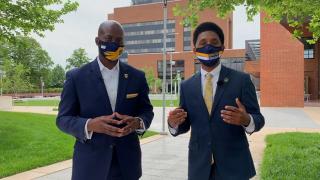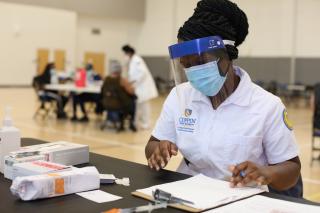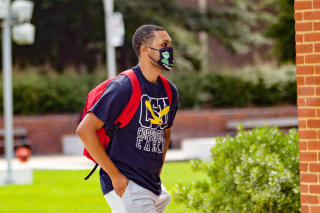Community Health Updates
Campus Guidance for Monkeypox
CSU is working with the local health department to provide the best guidance for our faculty, staff, and students. Since monkeypox is a communicable disease that is transmitted person-to-person through skin contact, it is important that we continue to use the social and self-awareness guidelines to continue to practice prevention strategies including education, hand washing, and symptom monitoring.
Monkeypox symptoms include fever, body aches, backache, headache, fatigue, chills, enlarged lymph nodes, and a rash or red bumps that may begin on the hands or feet and spread to the face, mouth, arms, chest, legs, or genitals.
Please continue to practice prevention strategies including: washing hands well, avoiding touching individuals with suspected symptoms, as well as potentially infected objects, and be aware of any new bumps or rashes.
Individuals who are diagnosed by a healthcare provider with monkeypox will need to isolate.
Monkeypox Information
Information to assist the campus community in understanding monkeypox.
Monkeypox signs and symptoms include fever, body aches, backache, headache, fatigue, chills, enlarged lymph nodes, and a rash or red bumps that may begin on the hands or feet and spread to the face, mouth, arms, chest, legs, or genitals.
If you or someone you know suspects that has monkeypox:
- Do not touch the bump or avoid spreading the bump, and to avoid scarring, do not attempt to scratch.
- Keep your personal items secured in a private place.
- Do not touch the clothes or towels if anyone with suspected monkeypox.
- Hand washing is a key prevention strategy.
- If you are not able to wash your hands, use a sanitizer.
If someone is suspected of having monkeypox (MPX) or being exposed, they should contact the Community Health Center at (410) 951-4188 or their primary care provider. You can also visit a Baltimore City Health Department clinic, by appointment, for testing:
- 1200 E Fayette St | (410) 396-9410
- 1515 W North Ave | (410) 396-0176
Campus Response to COVID-19
Being prepared is critical to Coppin State University’s readiness to prevent community spread of the coronavirus (COVID-19). To address this public health concern, this website is developed to provide a cohesive CSU voice to strategies implemented to decrease the spread, the implications on travel arrangements, and steps taken to work in conjunction with the guidelines provided by the University System of Maryland (USM), the local health department, state, and federal entities. The information presented represents our commitment to our mission rooted in social responsibility, civic, and community engagement. We remain committed to the health and safety of the Coppin Community.
Information and Resources
- Emergency Paid Sick Leave & Public Health Emergency Leave
- ADA-ADAAA & Accommodation Policy & Procedures
- Request Form for Medical Exemption from COVID-19 Vaccination
- Request Form for Religious Exemption from COVID-19 Vaccination
- Annual Leave Carryover Guidance
- Updates to Attendance Requirements and Time Entry Practices
- LifeResources Program
- University Continuity Resources
Daily Prevention and Preparedness
Commonly Reported Symptoms
Commonly reported symptoms of COVID-19 infection include fever, cough, shortness of breath, and increased respiratory rate. It is believed that most infected people will develop symptoms two to 14 days after they were exposed (source: Maryland Department of Health).
What To Do If You Experience Symptoms
If you develop or have symptoms of coronavirus (COVID-19) including fever, cough, or respiratory symptoms and have recently traveled to an area with ongoing spread, plan to seek health care immediately by visiting your designated health care provider or the Community Health Center located at 2601 West North Avenue in the Health and Human Services Building. Call ahead to let the healthcare provider know about your recent travel or community-related contact. The Community Health Center phone number is 410-951-4188. Avoid contact with others until you have been evaluated by a health care provider. The healthcare professional will work with the Baltimore City public health department in regard to testing guidelines for COVID-19.
The guidelines from Ready.gov (2020) include limiting the spread of germs and preventing infection by:
- Avoiding close contact with people who are sick.
- When you are sick, keeping your distance from others to protect them from getting sick too.
- Covering your mouth and nose with a tissue when coughing or sneezing. It may prevent those around you from getting sick.
- Washing your hands often will help protect you from germs.
- Avoid touching your eyes, nose or mouth.
- Practicing other good health habits. Get plenty of sleep, be physically active, manage your stress, drink plenty of fluids, and eat nutritious food.
Resources for Additional Information
- Center for Disease Control Frequently Asked Questions
- Center for Disease Control Travel Information
- Center for Disease Control Guidelines for Community and Gatherings
- The World Health Organization (WHO) provides guidelines to reduce exposure to and transmission of a range of illnesses including the coronavirus (COVID-19)
- Personal Preparedness Strategies can be found at Ready.gov.
- Novel Coronavirus Q & A with University of Maryland Baltimore (UMB) University System of Maryland (USM-Network University) Dr. Chen
Coppin State University Resources
Additional information may be found at the CSU Public Safety, Emergency Procedures website.
Please feel free to call the CSU Community Health Center at 410-951-4188 should you need health care assistance or a Health Care service provider. More information about the Community Health Center can be found at https://www.coppin.edu/chc.
To learn more about CSU’s response to the coronavirus (COVID-19), connect with us on Facebook, Twitter, or Instagram.
Any questions related to Coppin State’s COVID-19 preparations and protocols can be submitted to COVID-19@coppin.edu.
COVID-19 Task Force
Dr. Anthony L. Jenkins, President
Angela G. Galeano, Project Manager
| Name | Title | E-mail Address |
|---|---|---|
| Barland, Karen | Registrar | kbarland@coppin.edu |
| Bolden, Errol | Professor, DSW | ebolden@coppin.edu |
| Byrd, Marcus | Director of Financial Aid | mbyrd@coppin.edu |
| Carter, Dameon | Chief of Campus Safety | damecarter@coppin.edu |
| Carter, Derek | Director of Athletics | decarter@coppin.edu |
| Curbeam, Dionne | Deputy CIO | dcurbeam@coppin.edu |
| Danik, Stephen | VP, Administration & Finance | sdanik@coppin.edu |
| Darden, Shavon | Associate Director | sdarden@coppin.edu |
| Davis, Cataria | Associate Professor, HIM | cadavis@coppin.edu |
| Early, Lisa | Associate VP, CHRO | learly@coppin.edu |
| El-Haggan, Ahmed | VP, Chief IT Officer | aelhaggan@coppin.edu |
| Eugene, Nicholas | Faculty Senate President | neugene@coppin.edu |
| Evans, Justin | SGA President | jevans13@studentcoppin.onmicrosoft.com |
| Galeano, Angela | Chief of Staff | agaleano@coppin.edu |
| Green, Synethia | Program Specialist | sygreen@coppin.edu |
| Gregory, Sadie | Dean, College of Business | srgregory@coppin.edu |
| Humbert, Joshua | VP, Institutional Advancement | jhumbert@coppin.edu |
| Jenkins, Anthony | President | anjenkins@coppin.edu |
| Lewis, Leontye | Dean, College of Arts, Sciences, and Education | llewis@coppin.edu |
| Director of Communications | ||
| McNeil, Jinawa | Director of Admissions | jmcneil@coppin.edu |
| Murray, Tracey | Dean, College of Health Professions | tmurray@coppin.edu |
| OBryant, Beverly | Dean, CBSS | bobryant@coppin.edu |
| Oliver, Yvonne | Staff Senate President | yoliver@coppin.edu |
| Owens, Mary | Dean, CASE | mowens@coppin.edu |
| Person, Nichole | Associate Athletics Director | nperson@coppin.edu |
| Pertee, Kevin | Director, Residence Life | kpertee@coppin.edu |
| Thomas, Roy | Assistant VP, Facilities | rothomas@coppin.edu |
| Wonsey, Jacquelyn | Director, Housing | jwonsey@coppin.edu |


